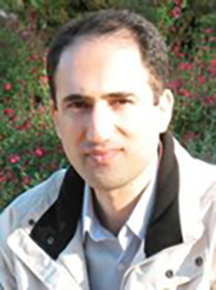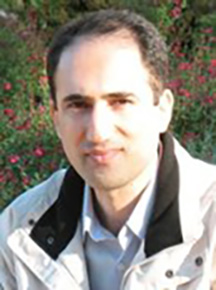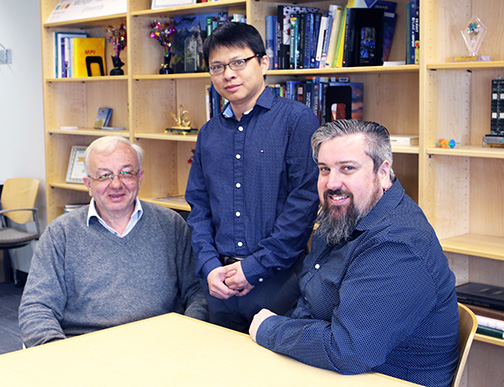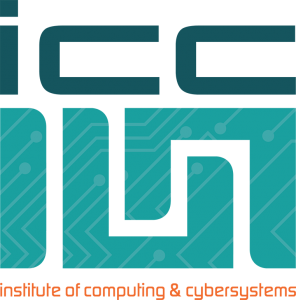
An article co-authored by Ali Ebnenasir (SAS/CS) and Alex Klinkhamer, “Verification of Livelock-Freedom and Self-Stabilization on Parameterized Rings,” was recently published in ACM Transactions on Computational Logic.
Abstract: This article investigates the verification of livelock-freedom and self-stabilization on parameterized rings consisting of symmetric, constant space, deterministic, and self-disabling processes. The results of this article have a significant impact on several fields, including scalable distributed systems, resilient and self-* systems, and verification of parameterized systems. First, we identify necessary and sufficient local conditions for the existence of global livelocks in parameterized unidirectional rings with unbounded (but finite) number of processes under the interleaving semantics. Using a reduction from the periodic domino problem, we show that, in general, verifying livelock-freedom of parameterized unidirectional rings is undecidable (specifically, Π10-complete) even for constant space, deterministic, and self-disabling processes. This result implies that verifying self-stabilization for parameterized rings of self-disabling processes is also undecidable. We also show that verifying livelock-freedom and self-stabilization remain undecidable under (1) synchronous execution semantics, (2) the FIFO consistency model, and (3) any scheduling policy. We then present a new scope-based method for detecting and constructing livelocks in parameterized rings. The proposed semi-algorithm behind our scope-based verification is based on a novel paradigm for the detection of livelocks that totally circumvents state space exploration. Our experimental results on an implementation of the proposed semi-algorithm are very promising as we have found livelocks in parameterized rings in a few microseconds on a regular laptop. The results of this article have significant implications for scalable distributed systems with cyclic topologies.
https://dl.acm.org/citation.cfm?id=3326456&dl=ACM&coll=DL
doi: 10.1145/3326456


 Zhuo Feng (ECE/ICC) is Principal Investigator on a project that has received a $500,000 research and development grant from the National Science Foundation. This potential three-year project is titled, “SHF: Small: Spectral Reduction of Large Graphs and Circuit Networks.”
Zhuo Feng (ECE/ICC) is Principal Investigator on a project that has received a $500,000 research and development grant from the National Science Foundation. This potential three-year project is titled, “SHF: Small: Spectral Reduction of Large Graphs and Circuit Networks.” The article “Topology-Specific Synthesis of Self-Stabilizing Parameterized Systems With Constant-Space Processes,” authored by Ali Ebnenasir (SAS/CS) and Alex Klinkhamer, has been accepted for publication in the journal IEEE Transactions on Software Engineering. Read the full article here:
The article “Topology-Specific Synthesis of Self-Stabilizing Parameterized Systems With Constant-Space Processes,” authored by Ali Ebnenasir (SAS/CS) and Alex Klinkhamer, has been accepted for publication in the journal IEEE Transactions on Software Engineering. Read the full article here:  Soner Onder (SAS, CS) will present a keynote address titled “Form Follows Function: The Case for Continuing ILP and General Purpose Computing Research” at the International Conference on Embedded Computer Systems: Architectures, Modeling and Simulation (SAMOS XIX), Samos Island, Greece, on July 7, 2019.
Soner Onder (SAS, CS) will present a keynote address titled “Form Follows Function: The Case for Continuing ILP and General Purpose Computing Research” at the International Conference on Embedded Computer Systems: Architectures, Modeling and Simulation (SAMOS XIX), Samos Island, Greece, on July 7, 2019. The article “Topology-Specific Synthesis of Self-Stabilizing Parameterized Systems With Constant-Space Processes,” authored by Ali Ebnenasir (SAS/CS) and Alex Klinkhamer, has been accepted for publication in the journal IEEE Transactions on Software Engineering. Read the full article here:
The article “Topology-Specific Synthesis of Self-Stabilizing Parameterized Systems With Constant-Space Processes,” authored by Ali Ebnenasir (SAS/CS) and Alex Klinkhamer, has been accepted for publication in the journal IEEE Transactions on Software Engineering. Read the full article here:  Dr. Soner Onder (CS, SAS) will present an invited talk titled “Program semantics meets architecture: What if we did not have branches?” at a workshop organized in honor of the 80th birthday of Prof. Yale Patt of University of Texas, Austin. Prof. Patt is a prominent researcher with decades of accomplishments in Computer Architecture.
Dr. Soner Onder (CS, SAS) will present an invited talk titled “Program semantics meets architecture: What if we did not have branches?” at a workshop organized in honor of the 80th birthday of Prof. Yale Patt of University of Texas, Austin. Prof. Patt is a prominent researcher with decades of accomplishments in Computer Architecture. At the annual awards banquet of the Michigan Tech Institute of Computing and Cybersysytems (ICC), on Friday, April 12, three ICC members received the ICC Achievement Award in recognition of their exceptional contributions to research and learning in the fields of computing.
At the annual awards banquet of the Michigan Tech Institute of Computing and Cybersysytems (ICC), on Friday, April 12, three ICC members received the ICC Achievement Award in recognition of their exceptional contributions to research and learning in the fields of computing. ICC Annual Retreat was held on April 21. Co-Director Dan Fuhrmann presented ICC Achievement Awards to two researchers for their outstanding research and honorable contributions to the ICC in 2017.
ICC Annual Retreat was held on April 21. Co-Director Dan Fuhrmann presented ICC Achievement Awards to two researchers for their outstanding research and honorable contributions to the ICC in 2017.